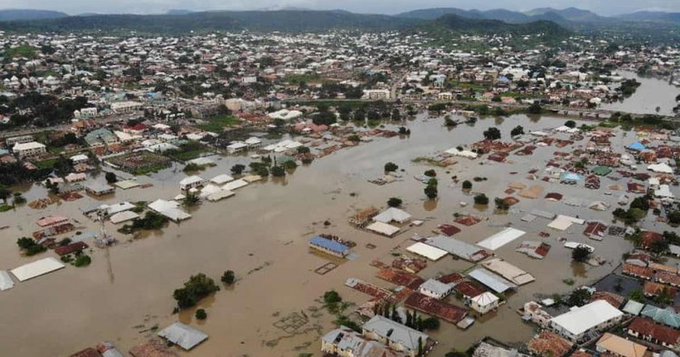Nigeria Flood Disaster: Toll Surpasses 600; Over 1.4 Million People Displaced, Buhari Orders Emergency Supplies To Bayelsa State
Floods in Nigeria has become an “overwhelming” disaster and many States were not properly prepared for them despite warnings, Minister for Humanitarian, Disaster Management has said.
More than 600 people have died in the worst flooding the West African nation has seen in a decade. Some 1.3 million people have been displaced, and more than 200,000 homes have been destroyed.
Flooding is expected to continue until the end of November. Nigeria is used to seasonal flooding, but this year has been significantly worse than usual.
The government has said unusually heavy rains and climate change are to blame.
President Muhammadu Buhari on Sunday expressed sadness at the devastation caused by floods in Bayelsa State.
He extended the nation’s condolences to the families of the victims and all those affected by this natural disaster.
According to released reports by the Bayelsa State Government, 700,000 persons have been displaced in about 300 communities and villages in five of the State’s eight local government areas that were submerged in water due to rains causing the floods.
While the authorities in the State are taking steps to help people hit by the floods, the President has directed that all federal agencies dealing with rescue and disaster management offer all needed assistance to Bayelsa.
Read Also:
President Buhari blamed buildings on water channels, disregard for early warning by the National Emergency Management Agency, NEMA, and the changes to weather caused by climate change as chiefly to blame for the floods that have so far hit 33 of the nation’s 36 states, as well as the Federal Capital Territory which has not been spared either.
The President also directed all concerned to work for the restoration of normalcy throughout the affected parts of the federation.
Experts also say poor planning and infrastructure have exacerbated the damage.
Since the flooding began in early summer, large swathes of farmland have been destroyed.
There are concerns about increased spread of disease, and food and fuel supplies have also been disrupted.
In a press conference on Sunday, Nigeria’s minister for humanitarian affairs and disaster management, Sadiya Umar Farouk, called on local authorities to evacuate people living in the most high-risk areas.
Authorities are already providing food and other support to those affected, she said.
She added that despite ”concerted efforts” and early warnings, many state governments “did not prepare” for the flooding.
The disaster has affected 27 of Nigeria’s 36 states.
Part of the problem is that people return to their homes on flood plains each year after the water levels subside.
Many do not have the means to relocate.
Nigeria’s economy has been battered in the past year, with inflation at an all-time high and many communities struggling to cope.
The World Food Programme and the UN’s Food and Agriculture Organisation said last month that Nigeria was among six countries facing a high risk of catastrophic levels of hunger.
Nigeria’s meteorological agency has warned that the flooding could continue until the end of November in some states in the south of the country, including Anambra, Delta, Rivers, Cross River and Bayelsa.
Credit: Global Upfront




